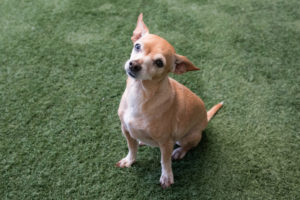
PET OF THE WEEK: Tessie is a gentle, 9-year-old tan Chihuahua who is ready for her forever home. This older gal is the full package: playful, fun, and affectionate; she’s great with dogs and has loved hanging out with kids. Tessie even does great on a leash and has learned a few new tricks! She’d be a fantastic dog for first-time owners. Ask for Tessie, ID# A435240. Adoptable pets are available at Peninsula Humane Society & SPCA’s Tom and Annette Lantos Center for Compassion, 1450 Rollins Road, Burlingame. For information, call 650-340-7022 or visit www.phs-spca.org. (Chuck Pitkofsky / Peninsula Humane Society)
Dear Miss Behavin’: We’re expecting a baby. Do you have any advice on how to prepare our “furry baby” for the new addition to our family?
Reply: You’ll want to prepare your “furry baby” for the big changes ahead, months before your due date. If your companion animal is not used to children, you want them to get comfortable with them prior to bringing your baby home. Positive experiences with babies will make your pet welcome the arrival of your new bundle of joy.
By having him meet as many well behaved children and babies as possible, always incorporating those moments with positive associations such as food and other rewards, he’ll quickly form a strong association. Conversely, drastically decreasing attention, scolding and changing your routine once the baby arrives will add stress on your pet. Consider these tips to help the transition go more smoothly:
- Address any pet training and behavior problems right away.
- Encourage friends with infants, babies and young children to visit your home and socialize with your pet before you are due.
- Have her become familiar with baby smells (baby oil, baby powder) and sounds (baby recordings are available) before the baby arrives. Also, try visuals, such as carrying a baby doll around wrapped in a blanket.
Once the baby comes home, make sure to include your dog or cat in some of the family activities. When feeding or cuddling baby, hand-feed Buster some favorite foods. He’ll quickly become interested in everything the baby does — even crying! — but remember to spend some alone time with your companion animal also. Other tips include:
- Introduce the baby gradually to the pet — supervise all pet and infant interactions.
- Remember you want him to have a positive experiences in association with the baby, so use plenty of treats and praise.
- Maintain a regular routine as much as possible to help your pet adjust.
- Spend quality one-on-one time with your pet, ideally each day.
